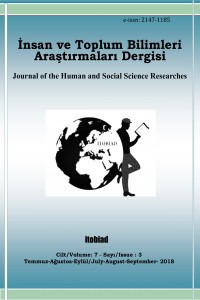Abstract
20. yüzyılın egemen
iktisadi politikası olan neo-liberalizm, birçok alanda olduğu gibi inşaat
sektörü için de yönlendirici güç olmuştur. Türkiye’de 1980’lerin sonundan itibaren neo-liberal ekonominin hayata
geçirilmesiyle, mimarlık mesleği özel sermaye ile daha fazla yüz yüze gelmeye
başlamış ve bu yüz yüze gelme durumu mimarlık pratiğine ve mimara yansımıştır. Bu noktadan hareket eden çalışmanın amacı, 21.
yüzyılda Türkiye’de neo-liberal ekonomi politikaların mimarlık mesleğini,
mimarı ve mimarın eğitimini ne şekilde etkilediğini incelemektir. Bu
amaçla yapılan dönemsel okumalar ve araştırmalar sonucunda, Türkiye’de neo-liberal siyasanın
itici gücüyle yapı sektörüne dayalı bir kalkınma politikasının benimsenmesiyle
mimarlık okullarının ve mimarların sayısının kontrolsüz bir artışa maruz
kaldığı tespit edilmiş ve buna bağlı olarak mimarın işgücü niteliğinin
sıradanlaştığı gözlenmiştir.
References
- Akyıldız, H., Eroğlu, Ö. (2004). Türkiye cumhuriyeti dönemi uygulanan iktisat politikaları. Süleyman Demirel Üniversitesi İBF Dergisi, 1 (1), 11-19.
- Boratav, K. (2011). Türkiye iktisat tarihi 1908-2009. İstanbul: İmge Yayınları, 254.
- Çınar, S. (2014). Taşeron çalışma ilişkilerinde inşaat işçileri. Sosyoloji Araştırmaları Dergisi, 17 (2), 37-70.
- Gottdiener, M. (1994). The social production of urban space. Austin: The University of Texas Press, 128.
- Gray, A. (2014). Unsocial Europe: social protection or flexploitation? London: Pluto Press, 68.
- Harvey, D. (2012). Sermayenin mekânları-eleştirel bir coğrafyaya doğru. İstanbul: Sel Yayıncılık, 517.
- İnal, A. (2014). İnşaat Sektörünün Ekonomik Büyümeye Etkisi (2002-2014) ve Sürdürülebilir Büyüme, Yüksek Lisans Tezi, TOBB Ekonomi ve Teknoloji Üniversitesi Sosyal Bilimler Enstitüsü, Ankara.
- Koçak, H. (2013). İnşaat işkolunda istihdamın yapısı ve emek rejiminin özellikleri. TTB Mesleki Sağlık ve Güvenlik Dergisi, 2 (1), 13-23.
- Küçükdoğu, M.Ş., Alioğlu, E.F., Dostoğlu, N., Esin, N., Türkçü, H.Ç., Coşgun, N. Enginöz, E.B, Arslan, M.E. (2013). Mimarlık bölümü açılması ve sürdürülmesinde aranacak asgari koşullar üzerine bir araştırma. Mimarlık, 374 (1), 60-68.
- Levi, E. (2015). Türkiye’de mimarlık eğitimine niceliksel bir bakış. Mimarlık 1 (381), 12.
- Manu P., Ankrah N., Proverbs D., Suresh S. (2013). Mitigating the health and safety influence of subcontracting in construction: the approach of main contractors. International Journal of Project Management, 1 (31), 1017–1026.
- Sayılan, F. (2006). Küresel aktörler (DB ve GATS) ve eğitimde neoliberal dönüşüm. TMMOB Jeoloji Mühendisleri Odası. Aylık Bülten Eğitim Dosyası. Kasım-Aralık, 44-51.
- Şafak, C., (2004). 4857 Sayılı iş kanunu çerçevesinde taşeron (alt işveren) meselesi. Türkiye Barolar Birliği Dergisi, 51, Mart/Nisan, 111-132.
- TMMOB. 44. Dönem Çalışma Raporu. (2016). Ankara: TMMOB Yayınları, 11.
- Öngel, S. (2014). Türkiye’de taşeronlaşmanın boyutları. DİS-AR Bülteni, Kış Sayısı, 8-17.
- Öz, Ö. (2001). Sources of competitive advantage of Turkish construction companies in international markets. Construction Management and Economics, 19 (2), 4-9.
- Tekeli, İ. (1988). Kentleşmeye kapital birikim süreçleri açısından bakmanın sağladığı açıklama olanakları. Defter Dergisi, 1 (5), 11-28.
- Tunçay, M. Koçak, C., Özdemir H. (1989). Çağdaş Türkiye tarihi: 1908-1980, İstanbul: Cem Yayınevi, s.47.
- Tural, N. K (2004). Küreselleşme ve üniversiteler. Ankara: Kök Yayıncılık, s.63.
Abstract
Neo-liberalism, the sovereign economic policy of the 20th century, has
been the driving force for the construction sector as it is in many areas. The
aim of this work is to examine how the 21. Century neo-liberal economic
policies in Turkey influences the architect and the architect’s education. As a
result of this purpose, the periodic reading and research, the neo-liberal
policy has the number of a development policy adopted by schools of
architecture and architects based on the construction sector, the driving force
has been found to be exposed to uncontrolled growth and has been observed
accordingly commonplace quality of labor force, the architect of Turkey.
References
- Akyıldız, H., Eroğlu, Ö. (2004). Türkiye cumhuriyeti dönemi uygulanan iktisat politikaları. Süleyman Demirel Üniversitesi İBF Dergisi, 1 (1), 11-19.
- Boratav, K. (2011). Türkiye iktisat tarihi 1908-2009. İstanbul: İmge Yayınları, 254.
- Çınar, S. (2014). Taşeron çalışma ilişkilerinde inşaat işçileri. Sosyoloji Araştırmaları Dergisi, 17 (2), 37-70.
- Gottdiener, M. (1994). The social production of urban space. Austin: The University of Texas Press, 128.
- Gray, A. (2014). Unsocial Europe: social protection or flexploitation? London: Pluto Press, 68.
- Harvey, D. (2012). Sermayenin mekânları-eleştirel bir coğrafyaya doğru. İstanbul: Sel Yayıncılık, 517.
- İnal, A. (2014). İnşaat Sektörünün Ekonomik Büyümeye Etkisi (2002-2014) ve Sürdürülebilir Büyüme, Yüksek Lisans Tezi, TOBB Ekonomi ve Teknoloji Üniversitesi Sosyal Bilimler Enstitüsü, Ankara.
- Koçak, H. (2013). İnşaat işkolunda istihdamın yapısı ve emek rejiminin özellikleri. TTB Mesleki Sağlık ve Güvenlik Dergisi, 2 (1), 13-23.
- Küçükdoğu, M.Ş., Alioğlu, E.F., Dostoğlu, N., Esin, N., Türkçü, H.Ç., Coşgun, N. Enginöz, E.B, Arslan, M.E. (2013). Mimarlık bölümü açılması ve sürdürülmesinde aranacak asgari koşullar üzerine bir araştırma. Mimarlık, 374 (1), 60-68.
- Levi, E. (2015). Türkiye’de mimarlık eğitimine niceliksel bir bakış. Mimarlık 1 (381), 12.
- Manu P., Ankrah N., Proverbs D., Suresh S. (2013). Mitigating the health and safety influence of subcontracting in construction: the approach of main contractors. International Journal of Project Management, 1 (31), 1017–1026.
- Sayılan, F. (2006). Küresel aktörler (DB ve GATS) ve eğitimde neoliberal dönüşüm. TMMOB Jeoloji Mühendisleri Odası. Aylık Bülten Eğitim Dosyası. Kasım-Aralık, 44-51.
- Şafak, C., (2004). 4857 Sayılı iş kanunu çerçevesinde taşeron (alt işveren) meselesi. Türkiye Barolar Birliği Dergisi, 51, Mart/Nisan, 111-132.
- TMMOB. 44. Dönem Çalışma Raporu. (2016). Ankara: TMMOB Yayınları, 11.
- Öngel, S. (2014). Türkiye’de taşeronlaşmanın boyutları. DİS-AR Bülteni, Kış Sayısı, 8-17.
- Öz, Ö. (2001). Sources of competitive advantage of Turkish construction companies in international markets. Construction Management and Economics, 19 (2), 4-9.
- Tekeli, İ. (1988). Kentleşmeye kapital birikim süreçleri açısından bakmanın sağladığı açıklama olanakları. Defter Dergisi, 1 (5), 11-28.
- Tunçay, M. Koçak, C., Özdemir H. (1989). Çağdaş Türkiye tarihi: 1908-1980, İstanbul: Cem Yayınevi, s.47.
- Tural, N. K (2004). Küreselleşme ve üniversiteler. Ankara: Kök Yayıncılık, s.63.
Details
| Primary Language | Turkish |
|---|---|
| Journal Section | Articles |
| Authors | |
| Publication Date | September 30, 2018 |
| Published in Issue | Year 2018 Volume: 7 Issue: 3 |


